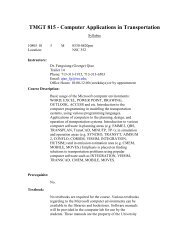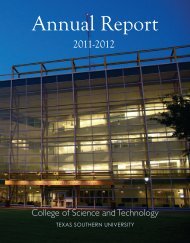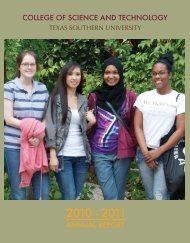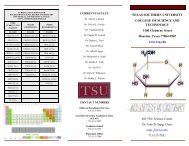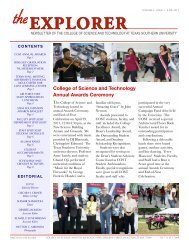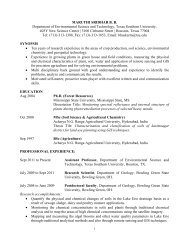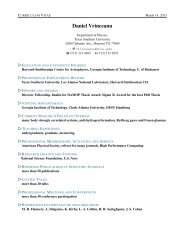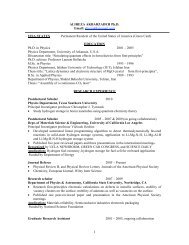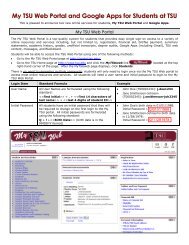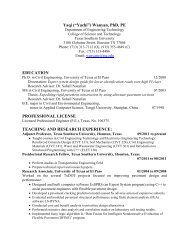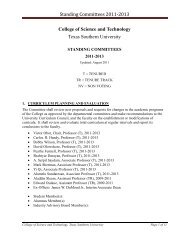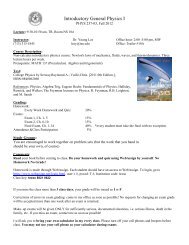Faculty Manual - COST Home Page - Texas Southern University
Faculty Manual - COST Home Page - Texas Southern University
Faculty Manual - COST Home Page - Texas Southern University
Create successful ePaper yourself
Turn your PDF publications into a flip-book with our unique Google optimized e-Paper software.
Sexual Harassment Policy<br />
In compliance with Title VII of the Civil Rights Act of 1964, as amended provides that it shall be<br />
an unlawful discriminatory practice for an employer, because of the sex of any person, to<br />
discharge without just cause, to refuse to hire, or otherwise discriminate against any person with<br />
respect to any matter directly or indirectly related to employment. The Equal Opportunity<br />
Commission (EEOC) has issued guidelines as to what constitutes sexual harassment of an<br />
employee under Title VII.<br />
Title IX of the Education Amendments of 1972,as amended prohibits sexual discrimination in<br />
any educational program or activity receiving federal financial assistance. This applies to <strong>Texas</strong><br />
<strong>Southern</strong> <strong>University</strong>.<br />
The Board of Regents has extended the policy to students at the university. Furthermore, under<br />
the EEOC guidelines, adopted by <strong>Texas</strong> <strong>Southern</strong> <strong>University</strong>, as well as case law the following<br />
conduct and activities are prohibited:<br />
(1). Unwelcome sexual advances;<br />
(2) requests for sexual favors, whether or not accompanied by promises or<br />
threats is made relating to the employment relationship (and in the case of<br />
students – their academic standing).<br />
(3) any verbal or physical conduct of a sexual nature that threatens or implies,<br />
either explicitly or implicitly, that an employee’s submission to or rejection<br />
of sexual advances will in any way influence any personnel decision<br />
regarding his or her employment (and in the case of students – their<br />
academic standing, employment, or career development).<br />
Sexual harassment of university faculty, staff, or students is strictly prohibited and subjects the<br />
offender to oral or written warnings, suspensions, transfer, demotion, or dismissal. A claimant<br />
may utilize the <strong>University</strong>’s compliance officer in the Human Resources Department to pursue a<br />
claim of sexual harassment.<br />
Hostile Work Environment Policy<br />
Combined with the new sexual harassment policy, the Board of Regents adopted a hostile work<br />
environment policy. It prohibits the following conduct:<br />
(1) Any verbal or physical conduct that has the purpose or effect of substantially interfering<br />
with an employee’s ability to do his or her job,<br />
(2) Any verbal or physical conduct that has the purpose or effect of creating an intimidating,<br />
hostile or offensive working environment,<br />
(3) Certain conduct in the workplace, whether physical or verbal, committed by supervisors or<br />
non-supervisory personnel, including but not limited to references to an individual’s body;<br />
use of sexually degrading words to describe an individual; offensive comments; off-color<br />
language or jokes; innuendoes; and sexually suggestive objects or behavior, books,<br />
magazines, photographs, cartoons or pictures.<br />
86



